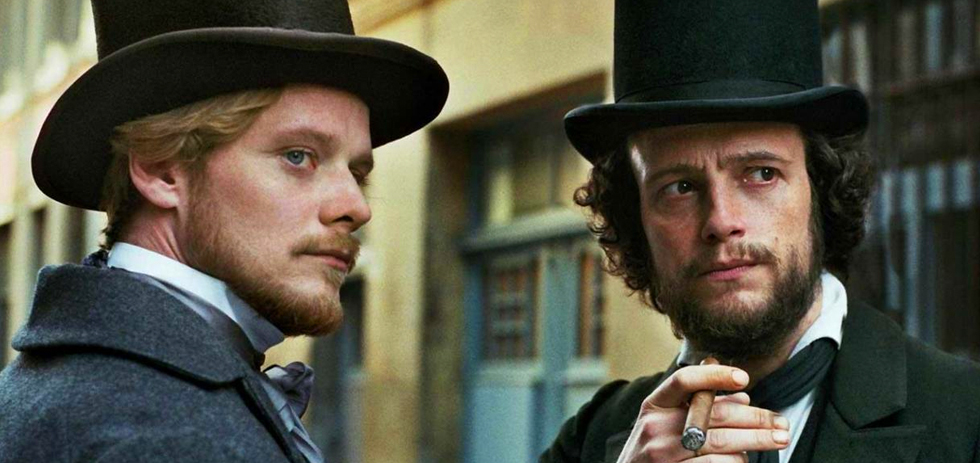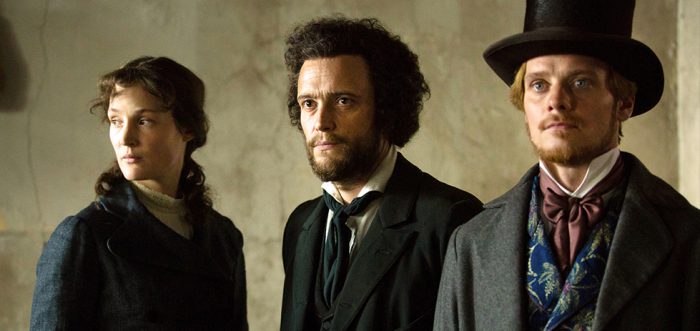
A dispute between workers and their employers at a textile factory in Manchester is a fitting, albeit unsurprising, opening to Raoul Peck’s The Young Karl Marx, a film that treads with caution as a biopic: it’s safe and accessible, though ultimately successful. In a brief moment of conflict, Mary Burns (Hannah Steele), an Irish worker, stands up against the factory owner, before swiftly being told to leave. The son of the boss is a young Friedrich Engels (Stefan Konarske), who disagrees with his father and storms out with similar haste. For Peck, this moment is a stand against the established order — one of many he depicts throughout the film. It’s a scene underpinned by an irreconcilability between ruling and working classes; one that forecasts the 10-year teleology the film centres itself around.
While Peck’s film is titled The Young Karl Marx, the name becomes increasingly laden with a certain irony as the film goes on. From the aforementioned opening scene, the work pushes back against a certain ‘Great Man’ theory of history. In the case of Karl Marx (August Diehl), Peck is insistent on contextualising his achievements as the product of behind-the-scenes arguments, debates, and collaborations with those closest to him. When we enter Marx’s life, he is living with his wife Jenny von Westphalen (Vicky Krieps) in Prussia, and writing for Rheinishe Zeitung. She isn’t framed as Marx’s aristocratic lover whose background allows him to focus on his writing, but instead, a partner whose influence on Marx is given due time on screen. Westphalen sarcastically suggests ‘Critique of Critical Critique’ as the subtitle that distinguished his 1844 work with Engels, The Holy Family, and throughout the film she’s a constant force — arguing with Pierre-Joseph Proudhon (Olivier Gourmet) in French, giving feedback on writing, and pushing back against ideas or phrasing she disagrees with. For Friedrich Engels, his immersion in the world of the working class is initially portrayed as contingent on his relationship with the Mary Burns, who meets his theories with genuine experience.
At one point, Engels tells Westphalen “no, the three of us.” She quickly replies: “It’ll take more than the three of us, don’t you think?”, presenting an understanding of struggle that comes as a subtle, yet pointed rebuke. Towards the end of the film, as Marx and Engels are writing what will become The Communist Manifesto (1848) and announcing “a spectre is haunting Europe”, they are not alone in the room. Peck portrays the process with precise sense of detail: we see Westphalen responding at times that “it doesn’t make sense” before changes are made, with Burns sitting in the same room. Images of their housekeeper, Helene ‘Lenchen’ Demuth, refilling tea and serving them food as they write comes off as another pointed inclusion, with Peck painting an image of the ‘The Young Karl Marx’ as the composite of far more than the single, mythologised individual — the title of the film perpetuates an idea that its content rallies against.

The friendship between Marx and Engels that plays out over the film has a interesting range to it. The intimacy is often moving, yet it can easy stray into cringe-worthy territory. In their first wholesome meeting, Marx and Engels snipe at each other for a couple of minutes, before their tensions evaporate and complete admiration takes hold. “You’ve made me realise something”, “me too” they announce, before taking turns to describe how the other is the most promising thought leader of their field. These oblivious moments of trite dialogue provide exchanges that at times demonstrate — one would hope — a shred of self-effacing awareness. At one point, after announcing the title ‘Critique of Critical Critique’, Marx and Engels receive Proudhon, who laughs and says “it’s very materialist… very Hegelian.” It’s a response that could have been lifted off any quality Marxist memes page on Facebook in 2017.
At its best, the film is detailed and its representations are often strong, but the nature of the form — and the borderline-blockbuster way in which the final product is edited together — puts it at risk of romanticising the struggle it portrays. The progression of events in the film, the way major shifts in thought are played out, the manner in which Marx and Engels garner influence within socialist and worker movements — plays out at times like a Marxist The West Wing. In a recent critique of that show, Luke Savage describes the process by which “the greatest political victories involve semantically dismantling an opponent’s argument or exposing its hypocrisy, usually by way of some grand rhetorical gesture.” The Young Karl Marx is framed around a far more substantial ideology than such Liberalism, yet it achieves its pace through an eerily similar method.
This might best be embodied in the scene where Marx and Engels enter the meeting for the League of the Just. Engels gives a convincing speech, while a few people heckle and throw insults at Marx, who responds with a few witticisms. They win the argument, hoist up a new banner for the Communist League, and that’s that. Marx and Engels get drunk and read Proudhon’s The Philosophy of Poverty. They remain drunk and, in a frenzy, produce their masterpiece response in The Poverty of Philosophy. The film adores supercuts, the Genius, and the moments where Marx or Engels gleefully destroy their opponents in debate, advancing on to the next stage. It’s corny during these moments, but at least portrays political ideas inherently less vapid than Aaron Sorkin’s much-feted TV show. Such predictable supercuts might be forgiven as a result.
While its sincerity and passion at times lends itself to cliche, The Young Karl Marx stands as a gripping introduction to its subject. It comes and goes in a tense dream of arguments, speeches, debate, and spectacle, Peck conducting a symphony of seismic shifts in thought, adorned with a series of snapshots of turning points in the lives of Marx and Engels. It doesn’t proselytise as much as it runs with an inherent assumption of the value of the ideas it portrays, taking a relatively dry series of historical events and making them refreshingly accessible.
